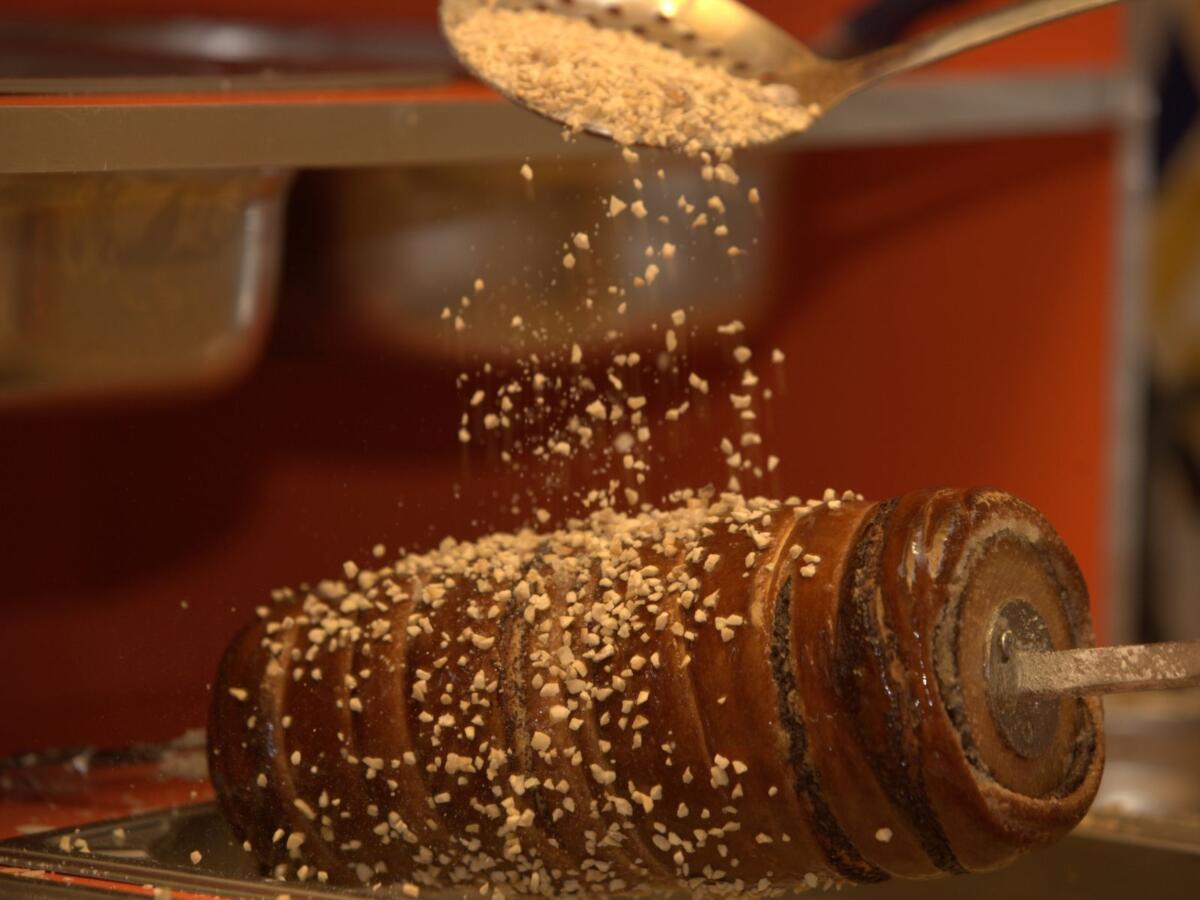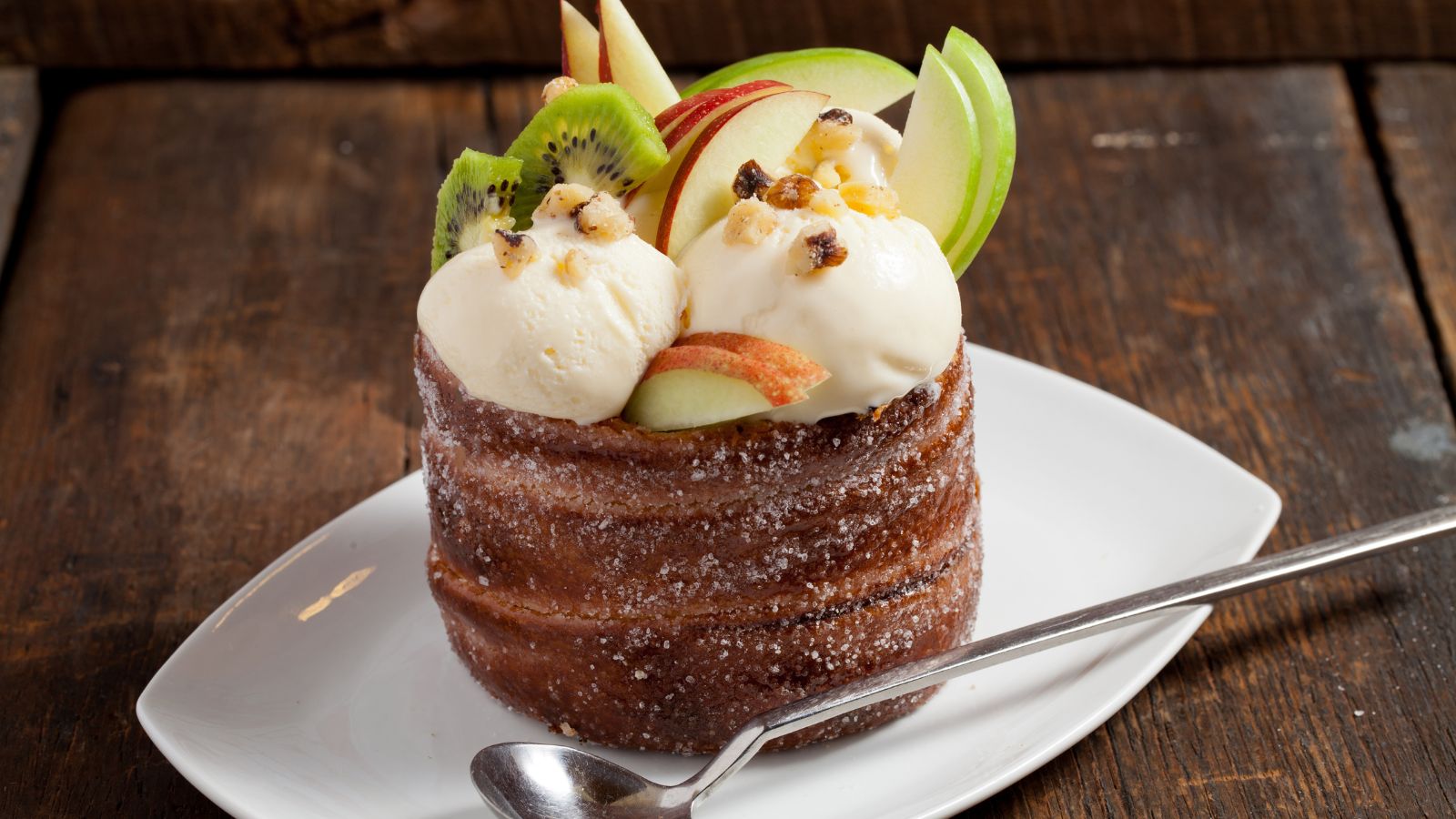Alongside babkas (known locally as Krantz cakes) and date-stuffed mamul cookies in Tel Aviv’s Carmel Market sits a spectacular pastry that’s become ubiquitous with the city: kiortosh. While “kiortosh” probably doesn’t ring any bells, maybe you’re familiar with the pastry by another name: “kürtőskalács” in Eastern and Central Europe, or “chimney cake,” in the U.S. (the English translation of kürtőskalács).
This tubular, hollow pastry has a crisp, caramelized exterior, but is soft and fluffy inside. It flakes apart easily, in the manner of a croissant, into chunky pieces (one kiortosh feeds around 4-5 people). You can enjoy it alongside your morning coffee or fill each piece with whipped cream, ice cream and/or fruit for a decadent sundae. In Hungary (and other European countries including Romania, Bulgaria and Czech Republic), where the pastry has been enjoyed for centuries, it is traditionally eaten on special occasions, like at fairs and holidays; or religious occasions, like baptisms.
Tel Aviv-born pastry chef, Doron Regev (now deceased), introduced kiortosh to Israel in 2006, when he opened a bakery named after the pastry on Tel Aviv’s central Bograshov Street. Branches in the Carmel Market, Jerusalem’s Machaneh Yehuda Market and other Israeli cities followed. Most of them are certified kosher, and many deliver via Wolt, a food delivery service that caters to Israel’s largest towns and cities.
In addition to altering the pastry’s name, Regev put his own spin on kiortosh in a number of ways. While it’s still a treat — it even comes wrapped like a present, in clear cellophane tied with a gold bow — kiortosh is not reserved for special occasions in Israel. Instead, it’s baked fresh every day and is just a click away, which is important to a culture who loves its daily “cafe v’maafe” (coffee and pastry).
The Nosher celebrates the traditions and recipes that have brought Jews together for centuries. Donate today to keep The Nosher's stories and recipes accessible to all.
It also tastes a little different to the original. While Regev’s father was a Hungarian immigrant — he arrived in Israel after World War Two – Regev’s kiortosh recipe is a riff on one he bought from an elderly lady in Transylvania, who was considered to be the master of the art by locals. Regev substituted her proposed vegetable shortening or sunflower oil for butter — a wise move that gives the pastry more than a hint of a croissant. And, in addition to the traditional caramelized, cinnamon and nut-coated (typically walnuts or almonds) kürtőskalács flavors, Regev added Middle Eastern ingredients inspired by his upbringing, like pistachio-coated and chocolate-halva kiortosh.
Many European countries continue to bake their chimney cakes over coals, imbuing them with a smokey flavor, which nods to their name (kürtőskalács is said to come from the Hungarian word “kürtő,” referring to the chimney of a traditional coal stove, though some attribute the name to the steam released from the top of the pastry after baking, which resembles a chimney). Regev’s, however, are baked on a modernized rotating mechanism, almost like a rotisserie chicken (or, to speak in local terms, like a shawarma), producing a cleaner — and, of course, buttery — flavor that will be familiar to any pastry lover. Regev achieves the signature tube shape by rolling his rich, yeasted dough in a spiral formation over a baking pin. Before baking, it’s sprinkled with sugar, which caramelizes as the pastry bakes to give a crisp exterior.
Despite Regev’s adjustments, Kiortosh bakery is extremely nostalgic for many locals. When the Bograshov branch opened, nearly half of Regev’s customers were Hungarian. The chance to taste their childhood again brought plenty of them to tears. It wasn’t long, however, before the whole country caught on to the delights of Kiortosh. At 35 NIS (around $10) per pastry, the bakery’s signature bake is well-priced to rival the other (excellent) bakeries on Bograshov Street, many of them French, offering their own rich, buttery baked goods.

For those yearning to try kiortosh, the bakery has plans to expand abroad — to Turkey, where Regev’s mother was from, Los Angeles and Las Vegas. We’ll be the first to update you when those plans come into fruition but, until then, a ticket to Israel is your best bet — the chocolate-halva kiortosh is well worth the trip.



